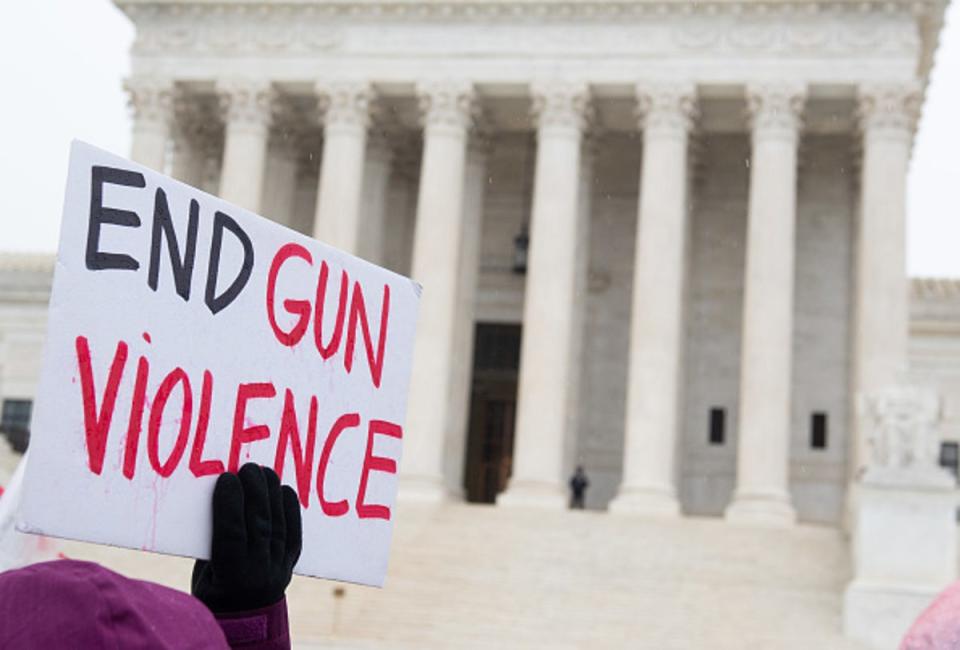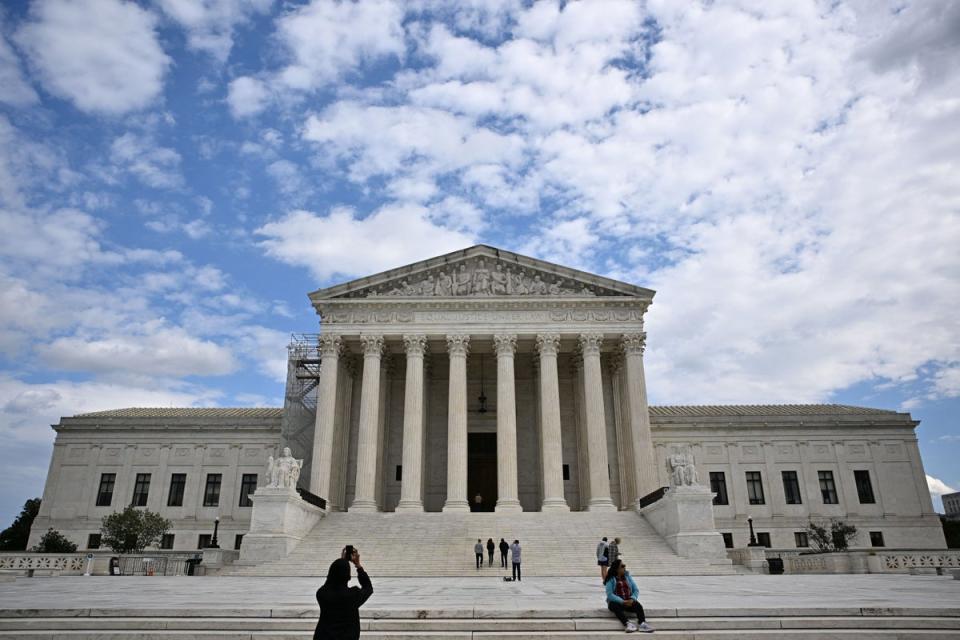Here are some of the biggest Supreme Court cases to watch this term
The Supreme Court is back in session.
At the end of September, the nine Supreme Court Justices reconvened to kick off the 2023-2024 term where they’re expected to hear cases concerning the Second Amendment, racial gerrymandering, free speech online and more.
Now more than ever, US voters are keeping a close eye on the highest court in the land after two contentious years produced a series of negatively viewed decisions.
Going into the new term, US voters can expect rulings to align more conservatively just as they have the last two years because the court’s majority leans that way.
Here are the cases to keep an eye on.
Racial gerrymandering: Alexander v South Carolina State Conference of the NAACP
In this case, justices are being asked to uphold or reverse a unanimous three-judge ruling that found South Carolina’s 1st Congressional District was unconstitutional.
The NAACP said the state’s legislature violated the Equal Protection Clause of the 14th Amendment by strategically moving a majority of Black voters into one district thus denying them their opportunity to elect a candidate of their choosing.
However, the state claims they only re-drew lines to benefit Republicans and did not target voters of a specific race when redistricting.
Oral arguments took place on 11 October.
A ruling in the case will set a precedent when it comes to re-districting in the state. The court already ruled against a similar situation in Allen v Milligan this past term.
Second Amendment: United States v Rahimi
This case questions whether individuals with domestic violence restraining orders against them can possess a firearm under the Second Amendment.
Oral arguments are set for 7 November.
A ruling in favour of Rahimi could allow people with a history of domestic violence to legally obtain a firearm, which has the potential to increase firearm-related domestic incidents.
Second Amendment: Brown v United States and Jackson v United States
The court is being asked to clarify language in the Armed Career Criminal Act (ACCA) that determines an individual is mandatorily sentenced to 15 years in prison minimum if they have three prior "violent felonies" or "serious drug offenses” in two consolidated cases.
In both cases, the petitioners argue they should not have received longer sentencing because their prior offences had different meanings due to state or federal law changes.
Oral arguments are set for 27 November
A ruling in the case could redefine what a “serious drug offense” means thus allowing people with prior drug convictions to obtain a firearm – something President Joe Biden’s son, Hunter Biden, is currently facing.

Disability rights: Acheson Hotels LLC v Laufer
In this disability rights case, the court is being asked to determine if an American with Disabilities Act (ADA) “tester” can challenge a hotel’s failure to provide accessibility information on its website.
Deborah Laufer, a self-proclaimed ADA “tester”, has brought hundreds of lawsuits against small hotels around the US for failing to include accessibility information online – despite not intending to visit many of the hotels.
Acheson Hotels LLC claims that Ms Laufer doesn’t have the right to bring a lawsuit forward because she wasn’t planning on visiting the hotel.
Oral arguments took place on 4 October.
A ruling in the case could either expand or ease ADA compliance, especially when it comes to websites.
Regulatory: Consumer Financial Protection Bureau v Community Financial Services Association of America
This case is asking justices to determine if the way the Consumer Financial Protection Bureau (CFPB) is currently funded by the Federal Reserve System is a violation of the Appropriations Clause of the Constitution which says money cannot be drawn from the Treasury without Congress’ approval.
Since its formation in 2011, the CFPB has been funded by the Federal Reserve System to implement and enforce federal consumer financial law and ensure markets are fair, transparent and competitive. The agency has jurisdiction over banks, credit unions, debt collectors and more.
Oral arguments took place on 3 October.
Though regulatory cases like this are typically boring and hard to understand, a ruling against CFPB could have massive implications by opening a door for others to challenge the funding of Medicare, Social Security and many more.

Administrative: Loper Bright Enterprises v Raimondo
The question being presented to the justices is whether the Court should reverse the Chevron Doctrine – a document that arose from the landmark case Chevron USA v Natural Resources Defense Council which requires courts to defer to the expert agency when making decisions in ambiguous situations.
The details of this case have to do with the National Marine Fisheries Service (NMFS) implementing a new rule that requires fishing companies to pay for third-party observers aboard specific boats.
An oral argument date has not been set yet.
A decision that reverses the Chevron doctrine would alter federal agencies (like the FDA) by allowing courts to bypass experts’ opinions when making decisions.
Administrative: Securities and Exchange Commission v Jarkesy,
In this case, the court is being asked to clarify a provision of the Dodd-Frank Act that allows the Securities and Exchange Commission (SEC) to make judgments and seek civil penalties it’s in in-house court. The plaintfill claims using the in-house system violates the Seventh Amendment which entitles a person to a jury during a civil trial.
Under the Dodd-Frank Act, a person accused of violating securities fraud would be subject to administrative law judges (ALJ) within the SEC but several flaws have been found in this system.
Oral arguments are set for 29 November.
Like CFBP v Community Financial Services, this case has the potential to open a door to how other agencies use the administration law process – or if they even can. Think about this impact for something like the Executive Office for Immigration Review.
First Amendment: Moody v NetChoice LLC and NetChoice LLC v Paxton
In these consolidated cases, the Court is being asked to determine if laws in Florida and Texas that prohibit social media platforms from removing speech is a violation of the First Amendment.
In Moody v NetChoice, the Florida law in question was passed in May 2021 and fines social media platforms for banning political candidates for more than 60 days or “journalistic enterprises” that have over 100k monthly users or 50k subscribers.
In NetChoice v Paxton, the Texas law in question forbade social media companies with 50 million users from removing or hiding content based on viewpoints among other governing rules.
Consolidated oral arguments in this case have not been scheduled yet.
A decision that upholds the laws in Florida and Texas could have substantial impacts on the use of social media opening the door for states to enact their own content moderation laws. It could prove particularly dicey when it comes to freedom of the press online.
First Amendment: Murthy v Missouri
The Court recently added this case to its docket in which they will need to decide if the Biden administration violated the First Amendment when asking social media companies to monitor speech online by taking down posts that circulate misinformation.
Respondents claim that the Biden administration actually censored conservative speech when they removed posts containing Covid-19, election integrity and other misinformation.
Oral arguments have not been scheduled yet.
First Amendment: Lindke v Freed and O’Connor-Ratcliff v Garnier
In these consolidated First Amendment rights cases, the court is being asked to define whether the speech a public official uses on social media to communicate job-related matters is considered state action and if blocking people violates the First Amendment.
In both cases, the petitioners (who are public officials in their respective towns) were sued by residents for blocking them or removing their comments from their Facebook or Twitter pages.
Oral arguments are set for 31 October.
The ruling in this case will set general rules as to how public officials may use social media when communicating about their jobs. If the court rules in favour of the respondents, government and public officials will likely have to completely separate official social media accounts from personal accounts.
Criminal law: Pulsifer v United States
In this criminal law case, the court is being asked to specify what the word “and” means in a sentencing statute provision of the First Step Act.
The provision allows individuals with nonviolent drug offenses to qualify for shorter sentencing so long as they do not have a lengthy criminal history, prior serious offense and prior violent offense. However, the language makes it unclear if a defendant qualifies for a shorter sentencing so long as they do not meet all three or if they are no longer qualified if they meet any single one.
Though the specificity of the word seems arbitrary it will determine if thousands of defendants in federal person could benefit from shorter sentences.
The court heard arguments on 2 October.
Trademark infringement: Vidal v Elster
Justices are being asked to decide if refusing to register a mark that criticises a government official or public figure violates the First Amendment.
The case has to do with Steve Elster’s attempt to register “TRUMP TOO SMALL” so he could sell it on t-shirts. It was rejected because US Patent and Trademark Office claimed he needed the written consent of Donald Trump since it used his last name.
Breaking News! USPTO files Petition for Certiorari in In re Elster (TRUMP TOO SMALL) Section 2(c) case.https://t.co/dyfvT9tn5b pic.twitter.com/ptDTD3TUhU
— TTABlog (@TTABlog) January 27, 2023
Justices are set to hear arguments on 1 November
A ruling in this case will determine if political speech about a public figure or government official can be trademarked. A decision in favour of Mr Elster would mean people in public official positions could lose some rights to name protections.
Bankruptcy code law: Harrington v Purdue Pharma
The Court is being asked to determine whether bankruptcy law allows for people who aren’t bankrupt to be protected by liability releases.
It stems from the settlement between Purdue Pharma and victims who overdosed on the company’s opioid drug, OxyContin. Purdue Pharma claimed bankruptcy – but the Sackler family, who owns Purdue Pharma, did not. In a deal the bankruptcy deal, the company agreed to pay victims in exchange for a liability release that shields the family from future civil lawsuits.
Oral arguments are set for 4 December.
A ruling in the case can be consequential for wealthy individuals or companies who are no strangers to using bankruptcy claims to get out of liability suits.

